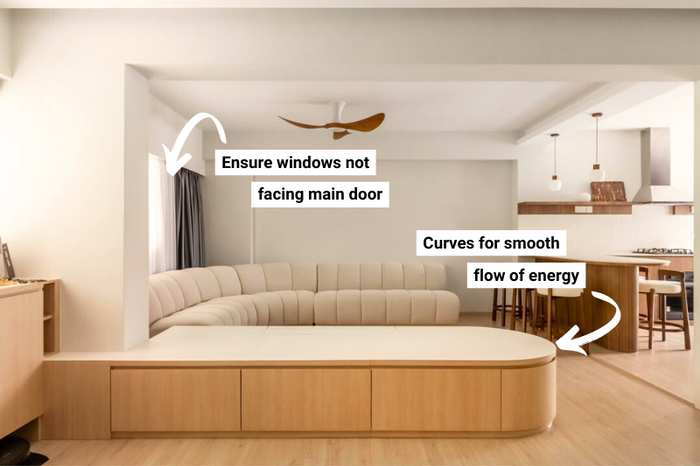So you don’t end up accidentally jeopardising your good fortune.
For believers of the Fengshui philosophy, there’s no doubt about the importance of harnessing the qi in your home. As you might have heard from friends and family (or even colleagues), a harmonious balance invites good health and prosperity.
This starts even before you choose a home, and continues through your renovation.

While figuring out the right balance differs from person to person and your home’s features, we’ve put together a general list of Fengshui taboos you should take note of based not just on research, but also conversations we’ve had with Fengshui masters, interior designers, fellow homeowners and even colleagues.
Based on that, here are Fengshui taboos to look out for – and how to fix them!
Fengshui taboos for choosing your home
1. Location of flat
Man-made elements

View this project by 9 Creation
Don’t choose a flat located near:
- Places of worship and hospitals: tend to have negative energies like sickness and grievances
- Police stations and government bodies: tend to have strong sha qi (unfavourable/negative qi), which is not suitable for sensitive and sickly people
However, if you have no alternative, find a unit where the main door (and back door, if applicable) does not face these places.

View this project by Place to Relax
Here’s one more: try not to pick a flat where sharp shapes/edges, like the triangular corner of a building, are pointing towards the units.
These are regarded as “poison arrow” structures that create negative energy and could impact aspects like career, health and relationships.
Of course, with how tight it can get in Singapore, avoiding it entirely might not be possible. A solution is to get day curtains to block the negative energy while still allowing light through.
Natural elements

View this project by SHE Interior
Based on Fengshui, It is best to avoid houses close to the sea as qi is unable to gather. If you’d still love to have a sea or waterfront view though, an alternative is to pick a flat that is further away.
Units exposed to fast-flowing wind, usually on higher levels, are also regarded as unfavourable.
2. Unit location

View this project by Ofthebox
Avoid selecting a unit where the main door is:
- Facing the corridor end – this encourages sha qi into your home
- Facing a flight of stairs – wealth rolls down the stairs as qi tends to gather on level ground, so it would be inauspicious
- Facing another unit’s main door – this tends to increase quarrelsome or conflicting energies
3. Unit layout

View this project by Supersketch Designers
When you get to the actual unit selection, avoid houses with ‘obstructions’ in the middle of the unit that block the energy flow within the home. These could be the toilets, kitchen or the bomb shelter/storeroom.
However, since certain HDB resale or BTO layouts would have either the household shelter or toilet closer to the centre of the home, one thing you can do is to keep the spaces free of clutter to attract positive energy, and ensure the plumbing is in good condition for bathrooms.
Another key point is to avoid units with two main doors – this confuses/disrupts the flow of qi. If it’s unavoidable, use only one door and keep the other permanently closed.
4. Home viewing

View this project by Forefront Interior
One important point not to forget when you’re actually viewing the home: take a reliable magnetic compass and check if the needle swings haphazardly. For instance, if the needle pointing North suddenly swings South.
This means the magnetic disturbance is too strong due to negative energies, and you should avoid such units.
Fengshui taboos for renovating and home decor
1. Front door directly facing windows
According to Fengshui principles, the front door should not directly face the window. The reason is that it could cause the good qi to leave, and subsequently may result in the loss of job/wealth opportunities.

View this project by Design Identity
To prevent this loss of favourable qi, consider getting a divider between the door and windows – this could be a loose bookshelf, or built-in carpentry like a false wall partition or a practical nook for putting on shoes.

View this project by Design Identity
2. Kitchen stove facing the sink
Planning on having your stove face the sink in a galley layout? It’s believed to bring health and relationship issues due to opposing elements (fire and water) clashing with each other.
Instead, consider a linear layout where the stove and sink are aligned.

View this project by Versaform
3. Having two separate gas stoves
If you’re planning on getting two separate gas stoves, it would be best to reconsider – this may indirectly encourage a third party into a relationship.

View this project by Ethan Interiors
Induction hobs, however, do not cause this issue since there is no fire element to them.
4. Bedroom entrance being directly opposite the bathroom
The bedroom entrance should also not directly face the bathroom entrance, but making structural changes to fix this can be a challenge.

View this project by Thom Signature Design
Instead, consider erecting a divider in front of the bathroom entrance to block the view from the bedroom door.
5. Positioning the bed directly facing the room door
While you should place the bed against the wall, it should not be directly facing the room door. This would result in your feet pointing straight out of the door, which is known as the “coffin position”.
The bed should also not be right next to the door.

View this project by Starry Homestead
To correct this, position the bed diagonally to the door in the ‘commanding’ position; this way, you have a view of the doorway but without the foot of the bed directly aligning with the door.
6. Mirror facing the bed
You might already know that having a mirror facing the bed can cause stress, and affect sleep and relationships.
Some believe that they invite negative energy and unwanted influences into the home.

View this project by Mr Shopper Studio
The solution? Tucking the mirror away or installing it inside a wardrobe.
7. Keeping large plants in bedrooms
No matter if you want a biophilic haven or just adore plants, avoid keeping large plants in the bedroom as these affect positive energy and disrupt sleep.

View this project by The Interior Lab
Instead, keep your bedroom uncluttered with minimal decor for a good flow of energy.
8. Keeping electronic devices on the bedside table
Don’t place electronic devices on your bedside table as this can interfere with the flow of qi.

View this project by Design 4 Space
While some believe it’s ideal to keep all electronic devices – from phones to televisions – completely out of the room, it might be inconvenient.
That’s why you could consider keeping them opposite your bed or somewhere out of reach.
9. Positioning the bed/sofa directly under structural ceiling beams or air conditioners
Do not put your bed or sofa directly under ceiling beams or air conditioners, as this creates a feeling of being ‘suppressed’ and could cause illness.

View this project by The I-Plan Studio
What you can do is move your bed to a different corner of the room to avoid the ceiling beam. If you happen to be combining two rooms, you can shift the bed to the other room if it doesn’t have a ceiling beam, just like these homeowners did.
10. Installing a spinning fan above the bed
Handling the Singapore heat is no mean feat, so you might be considering installing a ceiling fan in your bedroom. If you do, make sure not to install a spinning fan above the centre of the bed or directly where you’re lying on it.
Some believe the spinning blades ‘cut’ or disrupt the qi and disturb the harmony of relationships; it can cause stress and feel oppressive too when the blades are spinning.

View this project by Key Concept
If you don’t want to forgo a fan, you can position it just below the bed/at the foot of the bed, or consider a corner fan.
11. Having sharp, metallic decor
Like sharp edges of exterior buildings, sharp metallic decor are seen as ‘weapons’ that direct negative energy and cause accidents. Be sure not to install these above your head, the sofa or on the wall.

View this project by PRDT Interiors
The alternative is an element that is buzzing in Singaporean homes – curves! Choose decor and fixtures with soft, curved shapes instead.
12. Having an inauspicious lighting setup
Avoid configuring lights in a 2, 3, 5 or 7 arrangement as they’re inauspicious numbers – instead, go for those in a 1, 4, 6, 8 or 9 configuration.

View this project by Ethan Interiors
13. Hanging pendant lights above the bed
Hanging pendant lights directly above bed is believed to deflect qi, so you should consider hanging them over blank floor space in the room.
You could also opt for recessed downlights instead.

View this project by The Local Project
14. Sharp angles and corners within the home
Much like avoiding sharp angles/corners pointing towards the home, having them within the house can create negative energy.
Soften your interior with curves and wavy lines to encourage a good flow of qi.

View this project by Yang's Inspiration Design
15. Hanging dried flowers
While you might have plans to put up various decor, one thing to avoid is hanging dried flowers. These drain positive energy in a room because ‘dead’ objects have negative Yin energy, inviting ‘death’.

View this project by The Local INN.terior 新家室
You can choose live plants or landscape art in calming colours as an alternative.
16. Installing mismatched flooring
Having mismatched flooring, like graphic tiles that lead to different flooring like vinyl or large-format tiles, is believed to disrupt energy and peace at home.
Instead, go for a single flooring type in natural materials like stone and wood, or options like vinyl/laminates that mimic these.

View this project by Le Interior Affairs

 Get a budget estimate before meeting IDs
Get a budget estimate before meeting IDs